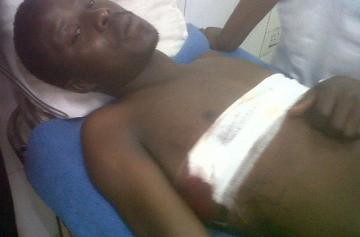
An injured man in Nigeria in the aftermath of another attack on Christians. The West African state has witnessed an upsurge in sectional violence., a photo by Pan-African News Wire File Photos on Flickr.
Prof, 15 others die in varsity church attack
By Kolade Adeyemi, Kano
Nigerian Nation
IT was like a scene from hell. All was solemn. The church service was on. Time was about 8.30a.m.
Suddenly, a huge explosion, preceded by gun shots, deafened the worshippers. The atmosphere became cloudy. There was pandemonium.
Minutes later, all was calm, no fewer than 16 people lay dead – victims of an Improvised Explosive Device (IED) thrown into the hall and gunshots by yet unknown assailants.
The attack bore the marks of the Islamist sect, Boko Haram (Western education is a sin).
The scene of horror was a lecture theatre at the old campus of the Bayero University in Kano used as a Christian worship centre.
In the congregation were students, lecturers and other categories of employees of the university and outsiders.
One of the 16 dead was Prof. Andrew Leo Ogbonyomi of the Department of Library Science.
About 16 others were believed to be injured, some of them critically.
But Kano police spokesman Magaji Majiya said seven people died and that the injured were taken to the Aminu Kano Teaching hospital (AKTH).
University spokesman Mustapha Zahradeen also gave the figure of the dead as seven.
AKTH spokesman Aminu Inuwa said 16 injured people were admitted at the hospital’s Emergency Ward.
But he declined to speak on the death toll.
Andronicus Adeyemo, an official with the Nigerian Red Cross, said a canvas of local hospitals and morgues showed the attack killed at least 16 people.
Some people were injured, though the aid agency did not immediately have an exact figure, Adeyemo said.
After the attack, police and soldiers cordoned off the campus as gunfire echoed in the surrounding streets. Abubakar Jibril, a spokesman for the National Emergency Management Agency (NEMA), said security forces refused to allow rescuers into the campus. Soldiers also turned away reporters from the university.
It was gathered that the attack was carried out by gunmen, numbering about 15, who stormed the campus on motorbikes. The gunmen had earlier laid a siege to the area before the arrival of worshipers for the service.
Sources said the service was barely 10 minutes old when sporadic gun shots were heard.
The witness said the gunmen threw some Improvised Explosives Devices in the lecture theatre and opened fire on those who attempted to run away from the scene.
The witness said members of the Joint Military Task Force (JTF) later arrived at the scene and engaged the attackers in a gun battle.
JTF spokesman Lt. Ikedichi Iweha said military operatives had been deployed in the area to restore order.
Iweha refused to give further details.
A victim, Faith Onche, a 400-level Accounting student who was hit by a bullet in her arm, narrated how the attack was carried out. She said the congregation had assembled for the day’s service at the open air theatre for interdenominational service. “Just a few minutes later, we heard gun shot sounds a few metres from the arena.
“Initially, it was mistaken by some of us for a burst tyre, until it became sporadic. It then dawned on us that it was a gun attack. At that point, there was stampede everybody scampered for safety,” she said.
She dismissed as false the impression that it was a bomb attack, insisting that she saw the gunmen, who opened fire on the worshipers.
The Indoor Sports complex accommodating Catholic worshippers was splattered with blood.
Many vehicles abandoned by fleeing panic-stricken worshippers, including motorbikes, were at the complex.
Men of the JTF intercepted a Mercedes Benz V Boot suspected to have been primed with explosives when they cordoned off the area. The anti-bomb unit of the police was immediately invited to the scene.
University sources told our reporter that the only time explosions were heard was when the attackers were escaping from the university after the operation, as they intermittently dropped Improvised Explosive Devices (IEDs) to scare people, while they escaped.
Kano was the scene of the deadliest Boko Haram attack so far when almost 200 people were killed in co-ordinated bombings and shootings on the North’s commercial city in January.
No comments:
Post a Comment